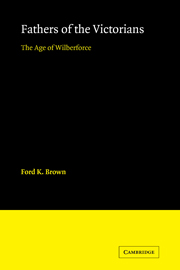Book contents
- Frontmatter
- Contents
- Dedication
- Foreword
- PART I WAR ON THE GENTILE WORLD
- PART II LABOURING FOR THE SPIRITUAL IMPROVEMENT OF OTHERS
- 6 Gangrening the Principles of the Country
- 7 Missionaries to England
- 8 The Crisis at Cambridge
- 9 Ten Thousand Compassions and Charities
- PART III ENGLAND IN DANGER
- Bibliography
- Index
6 - Gangrening the Principles of the Country
Published online by Cambridge University Press: 11 March 2010
- Frontmatter
- Contents
- Dedication
- Foreword
- PART I WAR ON THE GENTILE WORLD
- PART II LABOURING FOR THE SPIRITUAL IMPROVEMENT OF OTHERS
- 6 Gangrening the Principles of the Country
- 7 Missionaries to England
- 8 The Crisis at Cambridge
- 9 Ten Thousand Compassions and Charities
- PART III ENGLAND IN DANGER
- Bibliography
- Index
Summary
It is a fearful thing to think of, that this woman had under her tuition the children of a large portion of England.
william cobbett, 1802Every parish may be convulsed, and every Clergyman may be oppressed, if the cunning of Mrs More can thus combine such discordant principles together, can thus conjure up even good spirits, even the very angels of the church, to do her work of mischief for her.
The Anti-Jacobin Review, 1801No one has condemned, more strongly than ourselves, the personal invective and degrading acrimony, which have unhappily marked, in too many instances, this lengthened controversy. Such weapons we have uniformly rejected, and invariably deprecated.
The Anti-Jacobin Review, 1802This man's malice is inflamed by the Anti-Jacobin Magazine, which is spreading more mischief over the land than almost any other book, because it is doing it under the mask of loyalty. It is representing all serious men as hostile to government.
hannah more, 1800It is a most mischievous publication, which, by dint of assuming a tone of the highest loyalty and attachment to our establishment in church and state, secures a prejudice in its favour, and has declared war against what I think the most respectable and most useful of all orders of men-the serious clergy of the Church of England Its opposition to the evangelical clergy is carried on in so venomous a way, and with so much impudence, and so little regard to truth, that the mischief it does is very great indeed. It accuses them in the plainest terms, and sometimes by name, as being disaffected both to church and state.
wilberforce, 1800- Type
- Chapter
- Information
- Fathers of the VictoriansThe Age of Wilberforce, pp. 187 - 233Publisher: Cambridge University PressPrint publication year: 1961



